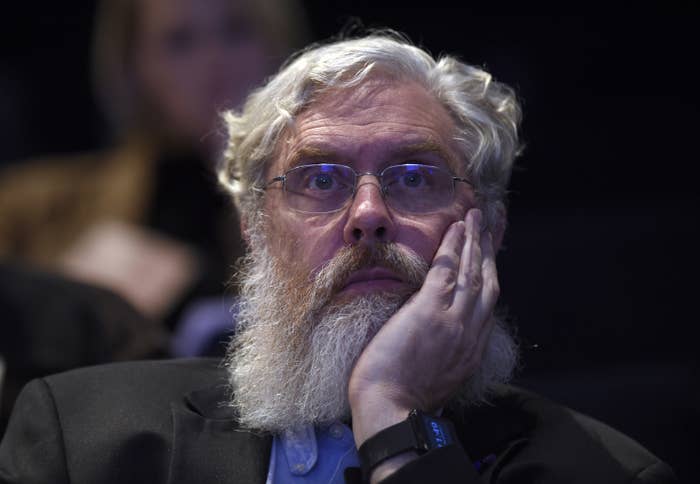
It’s time to build a synthetic human genome, say a group of famous scientists in an article published Thursday in the prestigious journal Science.
With this lofty pitch for the “Human Genome Project-Write,” the group hopes to attract major funders and collaborators to synthesize the human genome by laying down DNA letters like bricks, rather than cutting or pasting them from existing genomes.
“It’s essentially a call to action,” Andrew Hessel, a researcher at the San Francisco software company Autodesk and one of the project’s leaders, told BuzzFeed News. “We are suggesting it’s time to consider a new genome project standing on the foundations of the Human Genome Project,” he added, referring to the $3 billion, decade-long effort to decode the billions of letters of the human genome that ended in 2003.
The project’s other leads include: sequencing pioneer George Church, a professor at Harvard University; Jef Boeke, a professor at New York University’s Langone Medical Center who is part of a project to synthesize a yeast genome; and Nancy Kelley, a New York lawyer who specializes in genomics.
But other pillars of the synthetic biology field have strong misgivings about taking this approach.
“Boeke et al.’s current proposal should be broadly rejected and not now pursued,” Andrew Endy, professor of bioengineering at Stanford University, told BuzzFeed News by email.
Endy was among the researchers invited to Cambridge, Massachusetts last month for a controversial secret meeting to formally announce the “HGP-Write” project and discuss the technological hurdles and ethical issues associated with building a functioning human genome.
Endy decided not to attend because the organizers wanted to make the meeting private, telling attendees not to share details of the proceedings with reporters. He tweeted his disapproval, throwing the secret meeting into the public spotlight.
While the meeting was underway, Endy and Laurie Zoloth, professor of bioethics and medical humanities at Northwestern University, wrote an opinion piece arguing that new technologies like this genome synthesis should be discussed in open forums that include the public before they are pursued.
If you need secrecy to discuss your proposed research (synthesizing a human genome) you are doing something wrong.
For now the project has no research funding, but the leaders hope to raise $100 million in private and public funds by the end of this year. The goal, they say, is to create synthetic human cells.
“We’ve been very clear that this is not about making a synthetic human,” Hessel said.
The artificial human cells could have a range of possible uses, he added. They could help test the safety and efficacy of new drugs and vaccines, for example, or test genome edits that could confer immunity to diseases or resistance to cancer, or even help grow readily transplantable organs.
So far, a handful of research labs and companies are successfully assembling DNA strands a few thousand base pairs long, and past milestones have included the creation of a synthetic bacterial chromosome and a synthetic yeast chromosome.
Compared to these feats, the task of building the 3 billion paired letters of the human genome is a titanic one, the authors acknowledge in the Science article, and will need a whole suite of new tools. And a ton of money.
With today’s technology it is prohibitively expensive to build a genome that big. But these costs will drop over time, the scientists say, just as they did years ago when sequencing the human genome.
Hessel said the costs would likely reach $1 billion by the time the project reaches its goal — about a decade from now.
Autodesk, best known for its 3-D modeling software, is already endorsing the project. The company made a gift of $250,000 to launch the project, which helped fund the meeting in May this year.
“Autodesk is committed to contributing its vision, support, software expertise and experience to ensure that HGP-write is a successful leap for humanity,” Autodesk chief technology officer Jeff Kowalski wrote in a post on Medium.
Despite the enthusiasm from the private sector, some of the other researchers involved in the project are more cautious, pointing out that the proposal is preliminary and many years away from fruition.
“All of this is theoretical including all the scientific work,” Todd Kuiken, a senior program associate at the Woodrow Wilson International Center for Scholars who co-authored the report in Science, told BuzzFeed News. “Some people believe it’s the logical next step in terms of the capabilities of genomic technologies.”
Investing in the tools for synthesis would have the ripple-effect of helping the field at large, said Sriram Kosuri, a biochemistry professor at the University of California, Los Angeles, who was involved in early stages of the HGP-Write project.

But Endy and Zoloth remain unconvinced. In response to the article, they told BuzzFeed News by email that the project has “enormous ethical and theological implication[s]” and must begin with a more basic question: “Is developing capacities to synthesize human genomes a good idea?”
“Boeke et al. fail to pose these essential questions,” they wrote. “In fact, in their proposal, Boeke et al. fail to pose any questions. Nor do they detail specific limits about what should not be done.”
The two said they want to see non-scientists — including “theologians, philosophers, trade unionists, PTA presidents, civil society groups, health care workers” — involved in the debate about if and how to begin such a project. They also cautioned that the funding sources must diversify beyond a single for-profit company.
Hank Greely, a professor of law and genetics at Stanford University, is also skeptical, saying that the Science article wouldn’t convince him to fund the effort.
“Why build a new chromosome rather than modify a working one?” he told BuzzFeed News by email. “It’s not clear to me why large scale synthesis should be substantially better.”
Others are worried that the involvement of corporate funders could allow them to influence the direction of research, and control access to the data and the technology.
“According to me it should be an open-source project,” Eleonore Pauwels, a bioethics researcher at the Wilson Center, told BuzzFeed News. Pauwels attended the Cambridge meeting and led a panel on research and ethics, but was not involved in the new report.
“When such a project has been backed by public funding," she said, "you don’t expect the company to keep trade secrets."
